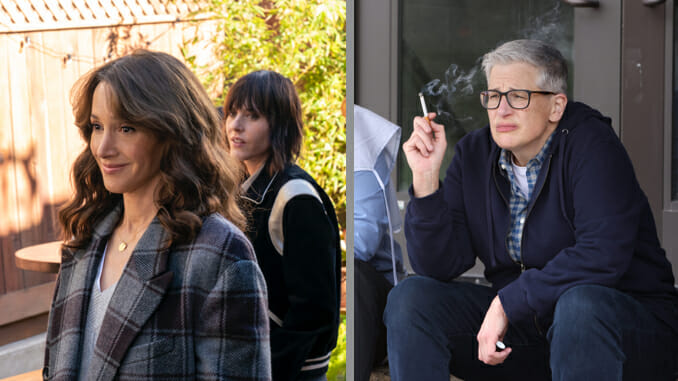Dyke Drama Reloaded: On the Second Seasons of The L Word: Generation Q and Work in Progress
Or, What Do the Lesbians Want?
Photo Courtesy of Showtime
In the first season of Showtime’s Work in Progress, improv duo Abby McEnany and Tim Mason’s zany, gallows-humor, semi-autobiographical character study of a 45-year-old fat, OCD-diagnosed butch at the end of her rope, McEnany (playing herself) makes the case for the futility of rehabilitating a broken fictional structure. Through a series of mundane coincidences, her brand new, swoon-worthy trans boyfriend Chris (Theo Germaine) convinces Abby to confront Saturday Night Live alum Julia Sweeney (playing a fictionalized version of herself), whose obtuse, obese, and gender-confused sketch character Pat has made Abby’s life a living hell. Julia and Abby strike up an uneven friendship, which Julia ultimately destroys in her attempt to right all of the sins of her past by bringing “Woke Pat” to a taping of This American Life. As Julia bulldozes Abby’s horror, Abby attempts to set her straight a final time: she would have preferred that Pat’s legacy be “buried.”
When it was first announced that Showtime’s revival The L Word: Generation Q (for “queer”) was in the works, murmurs of delight were matched by groans of frustration. Shouldn’t that be buried, too? The original series was an inarguable phenomenon that still serves as a touchstone for heated discussion, adoration, and overwhelming scorn—often simultaneously. In addition to the bonkers, self-destructive choices one can expect in a dishy serial, the series stuck to a select group of skinny, cisgender, rich white femmes as their most developed characters, often at the expense of all others. As creator and showrunner Ilene Chaiken routinely defended, the show was not meant to represent more than her own circle of affluent Los Angeles lesbians, and when it did introduce characters or storylines that touched on a less insular reality, it often bungled them into such an overblown tragedy that one might wish the show hadn’t even tried.
Among the tentative excitement and apprehension for its reboot, one of the most salient questions was why, a mere 15 years after its Showtime debut, the series would be taking a chunk of the meager space and budget allotted to queer shows. Why not build something new, rather than try to salvage already bowed beams? Chaiken, who is executive producing but has abdicated showrunning responsibility to independent filmmaker Marja-Lewis Ryan, had the same question and a stated reluctance to revive the series, but revealed that she didn’t see anyone picking up the mantle left in the wake of The L Word’s 2009 finale, and that the show had a duty to reemerge.
Even if it remains the only ensemble lesbian drama on air, the overall dearth of lesbians on TV is somewhat contested by both TV of the 2010s (Vida, P-Valley, Lost Girl, Orange Is the New Black), and quite pointedly by the simultaneous premiere of another Showtime series rife with dyke drama: Work in Progress. Considering its refreshing reluctance to explain itself or its zaniness, it’s something of a miracle that a second delightful, supremely uncomfortable season has arrived—just a few weeks after the premiere of the second season of Generation Q. The two series take such polar opposite approaches to representing queer life that they exist as funhouse mirrors, as well as an unexpectedly provocative double feature that asks us what we really want out of our burdened queer media.
In their respective sophomore seasons, Gen Q and Work in Progress are working toward similarly thematic goals: they want to get to the truth of the matter. But the quest for truth, whether it is knowing oneself, crusading for someone else’s justice, or knowing what exactly you might be apologizing for, takes on totally different definitions between a reboot and an original.
For Gen Q, truth and honesty are most heavily weighted in representational storytelling, which amounts mostly to grandstanding. Intergenerational conflict, trans dating, polyamory, and racist institutional and political structures were all introduced last season in a heavy-handed, mission-driven script—because The L Word is now ostensibly for everyone, as encompassed by its late-added Q, and it doesn’t want anyone to forget that. This zeal to correct the political clumsiness of its past weighed its first season down, with new characters who paled in comparison to their original, fully backstoried counterparts, and dialogue that rang painfully symbolic and hollow. (Triumphantly yelling “Time’s Up” in total sincerity, anyone?)
Much of reigning queen of the ill-adjusted mommies Bette Porter’s (Jennifer Beals) campaign for Mayor of Los Angeles felt like a campaign for the show itself, and how much tangible good it could do if it were forgiven. In another example, almost all of therapist-in-training Micah’s (Leo Sheng) storyline was about the microagressions and tokenization he experienced as a trans man, while also being the least distinctive character on the show. Neither of them would feel out of place at Julia Sweeney’s This American Life taping.
-

-

-

-

-

-

-

-

-

-

-

-

-

-

-

-

-

-

-

-

-

-

-

-

-

-

-

-

-

-

-

-

-

-

-

-

-

-

-

-








































